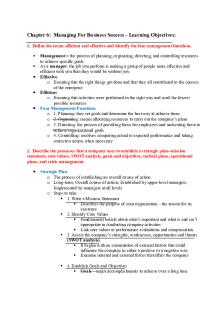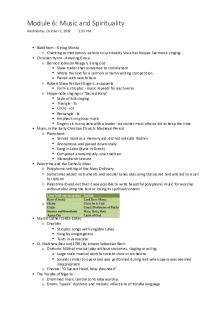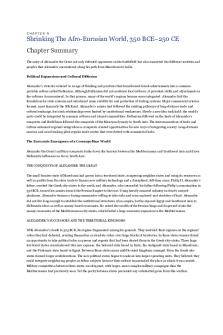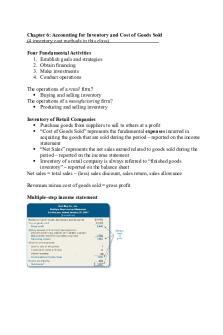Lecture 6 PDF

| Title | Lecture 6 |
|---|---|
| Author | Lee Kihara |
| Course | Bachelor of Commerce |
| Institution | Jomo Kenyatta University of Agriculture and Technology |
| Pages | 4 |
| File Size | 123 KB |
| File Type | |
| Total Downloads | 77 |
| Total Views | 138 |
Summary
INTERNATIONAL FINANCE...
Description
Lecture 6: International Arbitrage Arbitrage refers to capitalizing on discrepancies on quoted prices. This refers to maximizing profits at zero risk but not zero cost. Arbitrage in the foreign exchange and international money markets take three forms: a) Locational arbitrage b) Triangular arbitrage c) Covered interest arbitrage
1. Locational arbitrage: This refers to capitalizing on the differential exchange rates between locations. Example one Consider 2 banks KCB and CBA with the following information.:
Bid Tshs Quote
KCB Ask
Ksh 0.07
Ksh 0.08
Bid Ksh 0.09
CBA Ask Ksh 0.10
Required: Compute the gain from locational arbitrage for a Kenyan investor with Ksh. 2,000,000 to invest. Solution The investor will buy at ask and sell at bid. i)
Convert the Ksh. 2,000,000 to Tanzanian shillings Ksh. 0.08 = 1 Tshs. Ksh. 2M =? = 2,000,000/0.08 = 25M
ii)
Convert Tshs. 25M to Ksh. Ksh. 0.09 = 1 Tshs. ? = Tshs. 25M
1
= Ksh. 2,250,000 iii)
Arbitrage gain = Ksh. 2,250,000 – Ksh. 2,000,000 = Ksh. 250,000
2. Triangular arbitrage: Foreign exchange quotations are typically expressed in terms of US dollars regardless of the country in which the quotation is provided, yet there are many instances where the dollar is not part of the foreign exchange transaction. Cross exchange rates are used to determine the relationship between two non-dollar currencies. Given two non-dollar currencies A and B, the value of the currency A with respect to currency B is determined as: value of currency A∈dollars value of currency B∈dollars Whenever the actual exchange rate differs from the appropriate cross exchange rate, this provides an opportunity for triangular arbitrage. Example Two Consider the following actual exchange rates spotted in Standard Chartered Bank along Moi avenue in Nairobi; 1 Ksh = 0.015 dollars 1 Tshs = 0.0008 dollars 1 Ksh = Tshs 20 Compute the gain from triangular arbitrage to an investor with 200,000 dollars to invest. Solution i)
Calculate the cross exchange rate of the Ksh and compare with the actual exchange rate. Cross exchange rate = 0.015/0.0008 = 18.8 Hence 1 Ksh = Tshs 18.8 Since the actual exchange rate is Ksh 1 = Tshs 20
2
The Ksh is therefore overpriced. Hence first convert 200,000 dollars to Ksh (overpriced currency) Ksh 1 = 0.015 dollars ?
= 200,000 dollars
= Ksh 13,333,333 ii)
Convert the Ksh to Tshs Ksh 1 = Tshs 20 Ksh 13,333,333 =? = Tshs 266,666,667
iii)
Finally convert the Tshs to dollars. Tshs 1 = 0.0008 dollars Tshs 266,666,667 =? 213,333 dollars
iv)
Arbitrage gain = 213,333-200,000 = 13,333 dollars.
3. Covered interest arbitrage: This involves investing in a foreign country and covering against exchange rate risk. Example Three Assume you have Ksh. 10 million to invest for three months. The current spot rate of the Tshs. Is Ksh. 0.058. The three months’ forward rate of the Tshs. Is Ksh. 0.06. The Interest rate in Kenya is 20% per annum while in Tanzania is 30% per annum. Required; Calculate the gain from covered interest arbitrage. Solution Since the interest rate is attractive in Tanzania convert the Ksh to Tshs at spot rate and invest in Tanzania for three months. Tshs 1 = Ksh 0.058 ? 3
= Ksh 10 M
= Tshs 172,413,793 Invest at 30% per annum for three months;
[
A=P 1+
RT 100
]
[
]
30 ∗3 100 A=Tsh 172,413,793 1+ =Tsh 185,344,828 12 Convert back to Ksh at forward rate Tshs. 1 = Ksh 0.06 Tshs. 185,344,828 =? = Ksh 11,120,690 Suppose the money was invested in Kenya;
[
A=10,000,000 1+
]
20 3 + = Ksh 10,500,000 100 12
Arbitrage gain = Ksh 11,120,690 – Ksh 10,500,000 = Ksh 620,690
4...
Similar Free PDFs

Lecture 6 - week 6
- 32 Pages

Lecture notes, lecture 6
- 3 Pages

Lecture 6
- 5 Pages

Lecture 6
- 5 Pages

Lecture 6
- 2 Pages

Lecture 6
- 4 Pages

Lecture 6
- 11 Pages

Lecture 6
- 2 Pages

Ch 6 - Lecture notes 6
- 3 Pages

Chapter 6 - Lecture notes 6
- 5 Pages

Module 6 - Lecture notes 6
- 2 Pages

Chapter 6 - Lecture notes 6
- 6 Pages

Chapter 6 - Lecture notes 6
- 9 Pages

Anth101 6 - Lecture notes 6
- 4 Pages
Popular Institutions
- Tinajero National High School - Annex
- Politeknik Caltex Riau
- Yokohama City University
- SGT University
- University of Al-Qadisiyah
- Divine Word College of Vigan
- Techniek College Rotterdam
- Universidade de Santiago
- Universiti Teknologi MARA Cawangan Johor Kampus Pasir Gudang
- Poltekkes Kemenkes Yogyakarta
- Baguio City National High School
- Colegio san marcos
- preparatoria uno
- Centro de Bachillerato Tecnológico Industrial y de Servicios No. 107
- Dalian Maritime University
- Quang Trung Secondary School
- Colegio Tecnológico en Informática
- Corporación Regional de Educación Superior
- Grupo CEDVA
- Dar Al Uloom University
- Centro de Estudios Preuniversitarios de la Universidad Nacional de Ingeniería
- 上智大学
- Aakash International School, Nuna Majara
- San Felipe Neri Catholic School
- Kang Chiao International School - New Taipei City
- Misamis Occidental National High School
- Institución Educativa Escuela Normal Juan Ladrilleros
- Kolehiyo ng Pantukan
- Batanes State College
- Instituto Continental
- Sekolah Menengah Kejuruan Kesehatan Kaltara (Tarakan)
- Colegio de La Inmaculada Concepcion - Cebu

